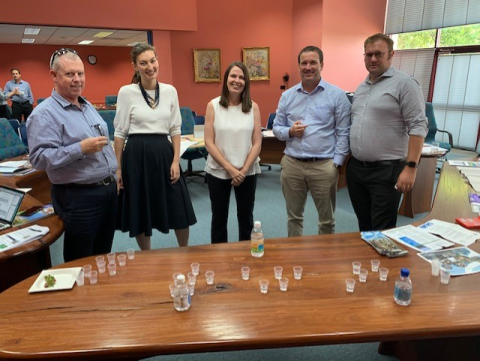Ensuring all water supply options are on the table is a key focus for WSAA. In October 2019 we released our All Options on the Table report, which focusses on one option that is sometimes left off the table – purified recycled water for drinking. The report looks at lessons learnt about community engagement, from places around the world where it has been considered and usually, adopted.

Russell Deans (Bathurst), Morgan Pauly (WSAA Young Utility Leader (Sydney Water), Danielle Francis (WSAA), Brendan Guiney (NSW Water Directorate) and Andrew Francis (Parkes) sample purified recycled water from around the world at the Cowra workshop.
In December WSAA held All Options workshops in Cowra and Armidale, to share information with water managers in regional areas. The workshops were not about identifying purified recycled water for drinking as the way forward for any town, but to go through key lessons learnt about having a conversation about it with the community, in case that occurs. We also gave participants a taste of purified recycled water from Singapore, Orange County (California) and Hampton Roads (Virginia USA).
The All Options report includes world-leading maps showing that purified recycled water for drinking has been adopted by 35 cities around the world, with more to come. That does not include the myriad cities all over the world where unacknowledged reuse has long occurred.
Some of the key findings on community education engagement include:
- It can be done – many towns in many countries have chosen it among other options as a safe and sustainable part of their water supply.
- The three ‘t’s – time, trust and transparency – are crucial elements in engaging with any community.
- Seeing is believing – there is immense value in running a demonstration project, and a visitor centre, to showcase and prove the technology. As part of this, establish a visitor centre or experience so that people can see the systems in action, learn how it works, and ask any questions in a calm, fun learning environment. This may include sampling the water.
- Wording and imagery are critical – words and images create perceptions and reactions, so it’s really important to choose these carefully.
- News media coverage has a profound impact on public acceptance, and political support is essential.
- Grass roots education and engagement can be more effective than high profile marketing activity or ‘above the line’ presence.
- General education around the urban water cycle and context will help prevent stigma and encourage acceptance.
- Regulators play a powerful role.
WSAA has also produced other materials about visitor centres around the world, which are, often part of a demonstration project. It would be valuable to see a demonstration project established in Eastern Australia – as Water Corporation did in Perth while considering their Groundwater Replenishment Scheme.
WSAA also has a range of easy to use videos, animations, posters, expert testimonials and other resources. These will help any utility looking to start or continue the conversation with their community, about purified recycled water for drinking.
For more information about the All Options on the Table report, holding a workshop or WSAA’s resources in this area please get in touch.
